 Academia and alcohol. Two acquired tastes -- both highly distilled and generally overpriced -- that seem like they should taste great together. But which rarely do. And, more often than not, the combination of the two make for all kinds of disastrous scenarios, discomfiting intimacies and disproportionate levels of liver (and spirit) damage. Should you doubt my authority on this subject, I refer you to the enduringly vivid, collective portrait of alcoholic academentia created by the ensemble in this week's featured film, most especially the work by...
Academia and alcohol. Two acquired tastes -- both highly distilled and generally overpriced -- that seem like they should taste great together. But which rarely do. And, more often than not, the combination of the two make for all kinds of disastrous scenarios, discomfiting intimacies and disproportionate levels of liver (and spirit) damage. Should you doubt my authority on this subject, I refer you to the enduringly vivid, collective portrait of alcoholic academentia created by the ensemble in this week's featured film, most especially the work by...

...Sandy Dennis in Who's Afraid of Virginia Woolf (1966)
approximately 30 minutes and 10 seconds
9 scenes
roughly 23% of film's total running time
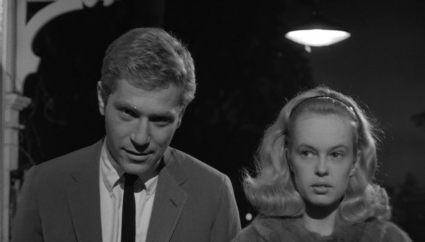 Dennis's Honey is the sort of faculty wife who takes her job seriously, making certain that she's meeting and mingling with all the right people.
Dennis's Honey is the sort of faculty wife who takes her job seriously, making certain that she's meeting and mingling with all the right people.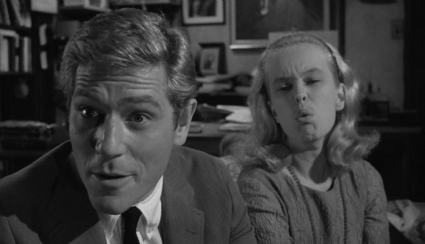 Indeed, it seems that Dennis's Honey has decided that her best defense is a good offense and that, by insinuating herself into the consciousness of her husband's colleagues, she might better keep track of her charismatic husband's wandering eye (as well as those wandering hands that seem so attracted to his well-toned physique).
Indeed, it seems that Dennis's Honey has decided that her best defense is a good offense and that, by insinuating herself into the consciousness of her husband's colleagues, she might better keep track of her charismatic husband's wandering eye (as well as those wandering hands that seem so attracted to his well-toned physique).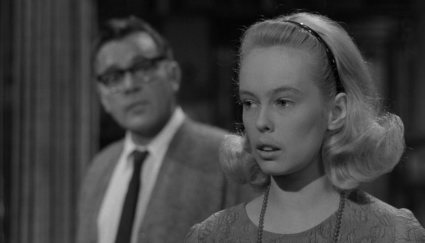 Honey's instinct for politics, however, does not come matched with a strong stomach and the heady combination of the untempered booze and hot-tempered banter soon begins to take its toll, causing Dennis' Honey to make routine retreats from the field of battle to what George evocatively calls the "euphemism."
Honey's instinct for politics, however, does not come matched with a strong stomach and the heady combination of the untempered booze and hot-tempered banter soon begins to take its toll, causing Dennis' Honey to make routine retreats from the field of battle to what George evocatively calls the "euphemism."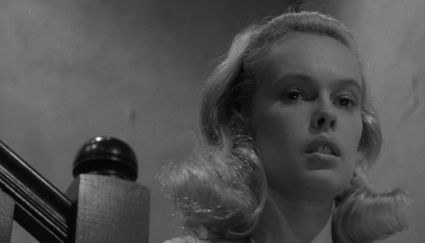 Sandy Dennis's approach to Honey is smart and vivid. Dennis establishes three main "tracks" for Honey: Honey's mask of social propriety (the clarity of which Dennis dissipates with each drink); Honey's inner turmoil about her relationship with her husband (the boil of which Dennis amplifies with each drink); and Honey's sharp, unconscious instinct for playing social games (the acuity of which Dennis maintains throughout).
Sandy Dennis's approach to Honey is smart and vivid. Dennis establishes three main "tracks" for Honey: Honey's mask of social propriety (the clarity of which Dennis dissipates with each drink); Honey's inner turmoil about her relationship with her husband (the boil of which Dennis amplifies with each drink); and Honey's sharp, unconscious instinct for playing social games (the acuity of which Dennis maintains throughout).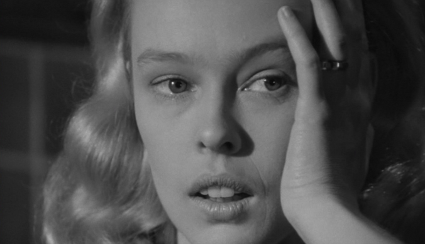 To my mind, Dennis's greatest accomplishment in the role is that she effectively sustains the impression that Honey is disastrously outmatched by the team of George and Martha even as Dennis charts how adept Honey's instincts are in playing their game. (Martha may steamroll over both George and Honey in her lascivious pursuit of amusement with Nick, but it is the combined force of George and Honey that ultimately bring Martha crashing down.)
To my mind, Dennis's greatest accomplishment in the role is that she effectively sustains the impression that Honey is disastrously outmatched by the team of George and Martha even as Dennis charts how adept Honey's instincts are in playing their game. (Martha may steamroll over both George and Honey in her lascivious pursuit of amusement with Nick, but it is the combined force of George and Honey that ultimately bring Martha crashing down.)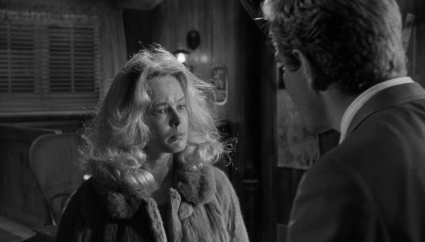 Dennis is a startling performer, an actress whose Method tic-ishness combines with her insectlike appearance to create extraordinary glimpses of anxious, despairing, elemental vulnerability. All of which works for Honey.
Dennis is a startling performer, an actress whose Method tic-ishness combines with her insectlike appearance to create extraordinary glimpses of anxious, despairing, elemental vulnerability. All of which works for Honey.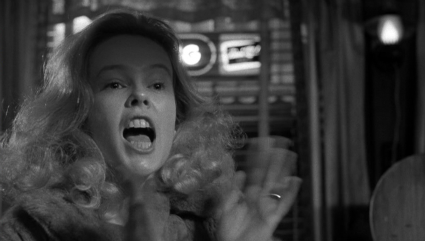 What also works for Honey is Dennis's capacity for demonstrating the apparent instinctiveness of the Honey's every move.
What also works for Honey is Dennis's capacity for demonstrating the apparent instinctiveness of the Honey's every move.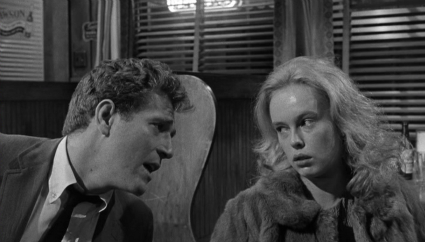 Rarely do we believe that Honey's in charge, or that she even has a clue what's going on, but this instinctiveness clarifies something essential about the character: in Martha and (especially) George, Honey has discovered people who speak her language. Honey may not be skilled as George or Martha in the sport of vicious manipulations and cruel fictions, but Dennis's Honey instinctively appreciates her own talent for such games.
Rarely do we believe that Honey's in charge, or that she even has a clue what's going on, but this instinctiveness clarifies something essential about the character: in Martha and (especially) George, Honey has discovered people who speak her language. Honey may not be skilled as George or Martha in the sport of vicious manipulations and cruel fictions, but Dennis's Honey instinctively appreciates her own talent for such games.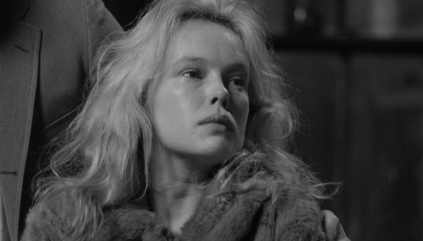 Honey may not understand precisely what she's doing when she collaborates effortlessly with George in destroying Martha but, as she does, something within Honey comes alive. Dennis conveys this discovery with feral, vaguely terrifying clarity.
Honey may not understand precisely what she's doing when she collaborates effortlessly with George in destroying Martha but, as she does, something within Honey comes alive. Dennis conveys this discovery with feral, vaguely terrifying clarity.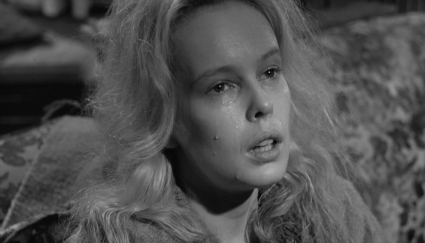 I don't know that I "like" Sandy Dennis's performance. (Her discomfiting twitches and gurgles instigate as much anxiety in me as they do in the character.) Nonetheless, I remain forever fascinated and amazed at the Sandy Dennis's skill in conveying Honey's depths, in terms both human and dramaturgic.
I don't know that I "like" Sandy Dennis's performance. (Her discomfiting twitches and gurgles instigate as much anxiety in me as they do in the character.) Nonetheless, I remain forever fascinated and amazed at the Sandy Dennis's skill in conveying Honey's depths, in terms both human and dramaturgic.
7 comments:
This is one of my favorite plays and Dennis did a great job (although I didn't really like her character).
But when I think Who's Afraid..., I think Elizabeth Taylor and her BRILLIANT take on Martha; it's my 2nd choice for Best Female performance ever.
I didn't like Sandy Dennis in this. She is by far the least deserving cast member, but she got the Oscar anyway. I agree with Alex, this movie belongs to Ms. Taylor and her terrific turn as Martha, even more fascinating considering Liz's age and screen persona at the time. This is what I call a bold career move.
I dunno.
I don't "like" Dennis in this, but I do feel strongly that she does a very solid job tracking everything about the character. She's, I fear, simply way too annoying on first (or third) pass...
(I would have very much preferred, though, to see the original Broadway Honey, Melinda Dillon, do the role on screen.)
And while I admire Taylor's balls in taking this role when she did, and I think she does a very solid job, I'm not a huge fan of the performance. Indeed, I really don't love any one performance in this piece all that much.
"Indeed, I really don't love any one performance in this piece all that much"
- not even Richard Burton?? :) I thought he was fabulous and he deserved to (finally) win. But then you have Scofield, who I think was quite overrated in A Man for All Seasons (upon which you'll comment soon :P ).
Every time I watch Woolf I find it impossible to take my eyes off Dennis and her kettle of mannerisms. She's acting, acting, acting every second, but she's also mesmerizing and funny with her many neurosises.
I would be interested to have seen Stella Stevens in the part, as she could have made Honey a more vunerable, natural counterpoint to George and Martha's theatrical ranting. Still, when I think of top supporting actress Oscar winners, Dennis always comes to mind as a candidate, as her work isn't the type one can ignore or forget (and her buzzing around that diner, chanting "I dance like the wind!" in an frazzled state, is one of the bravest, most unusual acting choices ever, IMO).
I can't get her reading of one line -- her verification of George's lie about eating the telegram -- out of my head:
"Yup. He did. He ate it right down."
So weird and so true and so haunting.
For me, Dennis's is surely one of the least pleasant performance ever to win, but it remains among the most memorable.
Oh, I forget about glorious Tuesday Weld- she also would've been very intriguing in the part.
I agree with Alex that Burton is superb as George, and deserved a lot more hosannas (Taylor nails her big scenes at the end, but Burton's work holds up the best).
And Stinkylu, I love your new 'do- I bet you "can hear the bells, just hear them chiming" in that getup.
When I was growing up, there was a Urban Legend going around that a Black Widow had landed in a woman's beehive and bitten her. Not too worry, though, with that "new look", you'll die of natural causes before a spider can ever work it's way down to your scalp. No one's touching your dome anytime soon.
Post a Comment